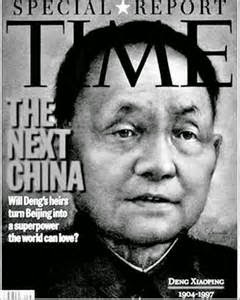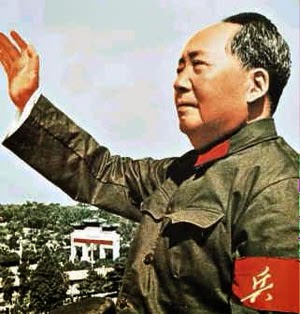This week's 'Letter from China' comes from the simple but
comfortable confines of Pappa Gourmet, a tiny café cum tea bar in one of the
slightly more salubrious side streets of Chang An. The place is only about ten
feet wide but nearly makes up for it by having a mezzanine floor. I use the
word 'nearly' advisedly, as those of us of slightly more generous height are
challenged to do anything other than stoop on the upper floor. Still, it is
comfortable, at least once one has levered one's long-legged frame into
position.
Many of the cafés and shops in this area follow the modern
trend of naming their shops using the alphabet commonly employed in English.
Most times, the premises bear two names, the Chinese and the English, but many
dispense with the Chinese altogether and just focus on the more fashionable
Anglo-Saxon. This trend has been noticed by the powers that be (and they are
considerable powers...) in China and reacted to. Much like the French and their
infamous 'Academie Francaise', there is
a feeling that the traditional culture, and the language in particular, is
under threat from the modern preponderance of English in the world's of
commerce and entertainment.
For my part, the adoption of more and more English cannot
come too soon. For the second time, before the start of this latest venture to
South China, I dedicated myself, quite earnestly and with a fair degree of determination, to the study
of Mandarin, both spoken and written. It seems though, that for the second time
this most complex of linguistic systems has defeated me utterly. After some
eight weeks of dedicated practice, averaging about an hour and a half a day,
and six weeks of actual exposure to China and the spoken language, I feel I
have barely scratched the surface of a scratch on the surface of the language.
I can manage, at a push, the very basics such as politeness
(to a point), asking for items in shops and enquiring after the price but
beyond such bargain basement Chinese, I am stumped. Even such simplicities as
asking directions, something that would come in handy in these bustling and
constantly confusing metropolises, are quite beyond me. I may be able to ask
the question but am utterly unable to comprehend the stream of apparently
disconnected syllables that is returned to me. My only recourse in such
circumstances is to follow the directions of the respondent's hands and nod,
murmuring the odd 'hao' (good) and 'haode' (fine) and trying not to look too
challenged.
This is, of course, hugely frustrating. The frustration was
so great in fact that I began to doubt my own ability to learn and
assimilate. I am no polyglot but can get by in German and have a little French.
In the past though, when I have spent some time in a new country, I usually
find that I can pick up the basics of what is needed to get by, at least to
some extent, within a relatively short time, even if this entails learning a
new alphabet as was the case in Thailand and Russia.
To test my own apparently dwindling abilities I decided to
look into another language to see if it would prove as difficult. I chose
Spanish as it is likely to come in handy for future flaneurial visits to Spain
and South America. I listened to some recordings from the redoubtable Michel
Thomas (a fascinating character whose biography is well worth looking up in its
own right – he packed an awful lot of living into his 91 years) and found that
far from being unresponsive that I was actually picking up the language like a
talented teenager. In three days I seem to have learnt the equivalent of two
months of Chinese, perhaps more.
So what is it that is so very difficult about Chinese that
it intimidates even the most accomplished of polyglots? I say this having just
read about the famous Italian cardinal, Joseph Mezzofanti, who was reported to be able to speak sixty languages fluently. Despite his previous acumen, it was rumoured
that he had a nervous breakdown when faced with Mandarin. This event not only
thwarted further progress in Chinese but led to him temporarily forgetting many
of his other languages.
The first problem with Mandarin is that it is a tonal language. This
implies that the meaning of words is changed by the tone attached to them. As an example we can use the seemingly simple two-letter syllable 'ma'. This can mean a piece
of hemp, a horse, to scold someone, a mother or can be used at the end of a
sentence to indicate a question is being asked, depending on the tone it is
uttered in. This multiplicity of meaning applies to every syllable that Chinese
uses. Often, to the European ear, simply picking up the fact that the tone has
changed in the first place is something of an achievement – to then add meaning
to that is bordering on a minor miracle.
The actual number of sounds employed by Mandarin is
relatively few but this only adds to the confusion. The same syllable can be
used multiple times even with the same tone and yet mean something completely
different. The syllable 'shi' for example has a grand total of some 32
meanings, depending on tone and context. That is roughly 31 too many for this
nomadic flaneur...
I could say a lot more in regards to the challenges of the
spoken language but, unbelievably, that is the easy part. When it comes to the
written, Mandarin is saddled with a writing system that is both ancient and
unbelievably cumbersome. The learner of English has to accumulate 26 letters
which, for the most part, equate fairly consistently with sound. In Russian the
task that faces the would be learner is 33 letters and for the Greek a mere 24.
To learn even the most basic Chinese reading skills one would have to
accumulate at least 2,000 symbols. Even then, it is thought that it would still
not be enough to read even basic newspaper articles and nowhere near enough for
any kind of literature. There are sinologists who have studied the language for
ten years and still cannot read even a simple novel in Mandarin.
The classic comeback to this observation is that the
symbols are made up of only about 200 radicals (or basic building blocks).
Again, this is only partly true. There are many words that have no radicals
whatsoever. Those that do have them are combined in many strange ways and, just
to make matters worse, the radicals often also change form when used in
combination - squished, squashed, bent or just completely different!
Combinations of radicals can be added to the left or the
right, above or below, inside or outside the main symbol with no guiding
principles whatsoever to predict their behaviour. Some add a degree of phonetic
clue but most don't. Some add a degree of semantic (meaning) significance but
again, most don't. The whole system, to put it mildly, is a complete mess. So
much so that to use the word 'system' seems unjustified in the case of Mandarin.
Finally, if one has stayed the course and actually manages
to recognise the symbols, just to make things interesting they are spaced
evenly with no indication if the word involved is made up by one, two or even
three of these collections of symbols. In English, we simply use a space to
indicate the end of one word and the start of another. In Chinese, one has to
work out which of the possible combinations is intended as the spacing itself
gives no clue. Oh, nearly forgot, just to add insult to injury, Chinese is
sometimes written left to right and sometimes top to bottom...
Back in the cosy confines of Papa Gourmet, I stare
uncomprehendingly at the menu which, after several weeks of trying, is just as
opaque to me as on the first day. One could, with sufficient dedication,
application and time master this language to the extent that one could 'get
by' (about 25 years should do it) but...
is it worth that much effort for such meagre returns? Unless there is a
pressing necessity to do so for business or personal reasons, I would suggest
that one's time might be more gainfully employed doing... almost anything other
than learning Mandarin!
Apparently, the Chinese Premier Xi Jingping himself
believes that rather than the Chinese learning English, the rest of the World
should now be learning Chinese. In response to this notion, I think I should
utilise a commonly used phrase from Spanglish...
No Way, José!
Just to show that sometimes the confusion goes both ways....











































